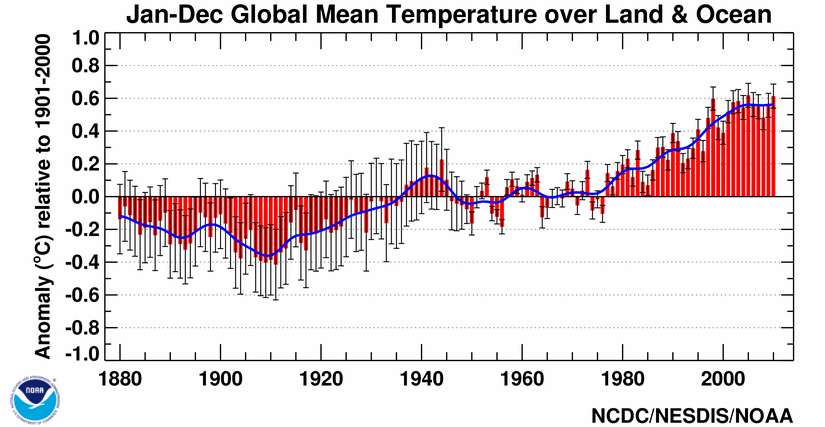""A dozen known causative effects, many of which are man made, have presented themselves,""
How about listing a few please or link to a list ??
First and foremost, agriculture and urbanization reduce the net vegetative total on the Earth. While relatively carbon neutral, this reduces the energy 'removed' from the system by photosynthesis processes - an energy balance term that is almost universally ignored by atmospheric chemists when they model climate.
Agriculture and urbanization also make drastic changes to the global albedo, causing more heat to be absorbed by the earth and less to be reflected. This is another energy balance term that is not only ignored by atmospheric chemists, some of them in the IPCC have had the gall to claim that our current level of agriculture and urbanization has produced a net cooling effect on the earth, even though the effect of urban heat islands is verifiable, and can be seen both from space and in local weather patterns.
Then of course there's a third major energy balance term that's ignored by climate scientists related to the other two - the hydrologic cycle itself. Every jump a molecule of water makes on its path through the hydrologic cycle is a loss of energy in the energy balance of the planet, which is ignored by the atmospheric chemists. The hydrologic cycle is the earth's primary mode of self-cooling. In fact, as the earth warms, and more water enters the atmosphere, the hydrologic cycle increases and bleeds off more heat. This again is measurable, in sea water temperatures several degrees lower after a hurricane passes over a region, but it's again ignored by the atmospheric chemists.
And the hydrologic cycle spills back into the albedo thing above, as well! Clouds are white. White reflects light. Increased cloud cover itself reduces global albedo. Another energy balance term ignored by the climate scientists.
Next, there's the effect that agriculture and urbanization has on the hydrologic cycle, by breaking the chain. Agricultural land produces less efficient evapotranspiration than fallow land, particularly the forests and grasslands typically plowed under for agricultural use, so that's an impediment to the earth's ability to cool itself. Urbanization has an even more profound impact on the hydrologic cycle, because you're sealing the rainwater away from the groundwater, making streams flashier, reducing base flow, and cutting that cycle off anywhere you build a city. Which, again, is ignored my the atmospheric chemists. So there's another energy balance term they ignore or downplay.
Then you've got direct heat, from the giant heat exchanger everyone has on their house and place of work. You've got direct heat from all the technology we use. You've got direct heat from the power plants we use in industry and power generation. This direct heat again can be seen from space, with satellites, but the IPCC does everything they can with some very sketchy science to show they shouldn't have to account for that energy balance term.
Then you've got changes in the fauna of the planet begot by human population expansion. I stuck this link in the last thread:
Mammals are very hot creatures by comparison to everything else on the planet. We have spread not only ourselves throughout it, but a fantastically large amount of other mammals, in terms of mass. That again ties in with all the aforementioned agricultural energy balance terms, but it creates new ones as well. There's a lot more methane in the atmosphere now than there used to be, due to the proliferation of livestock, and methane is a much more powerful greenhouse gas than CO2, chemically speaking, but its energy balance term too is ignored or downplayed by the atmo chemists.
Hey, check out the hockey stick on methane:
Looks familiar, doesn't it? It's the same hockey stick as carbon. And yet the atmospheric chemists are claiming that anthropogenic carbon is somehow worth more than total carbon to justify their models (after calibration) while not saying the same thing about methane. Why couldn't it be that methane is worth more than we expect?
Or perhaps, just perhaps, it's all of these things. And the real hockey stick we need to be calibrating our models to, is this one:
Every single one of the energy balance terms I mention above all have the same hockey stick shape. A climate model that looked at any one of them in isolation and none of the rest could be calibrated to that same hockey stick shape and still produce
good predictive results. But the quality of the predictions would say nothing about actual
causation, because all of these things are correlated to one thing: human population.
Now, why aren't the climate scientists looking at these other factors? Why in fact are they trying their best to downplay these other factors, intentionally, with some very sketchy science? I don't know for sure, but I'd guess it has something to do with where they're getting their funding.
Hydrology, Drainage Analysis, Flood Studies, and Complex Stormwater Litigation for Atlanta and the South East -
![[ponder] [ponder] [ponder]](/data/assets/smilies/ponder.gif)
![[ponder] [ponder] [ponder]](/data/assets/smilies/ponder.gif)


![[cow] [cow] [cow]](/data/assets/smilies/cow.gif)

